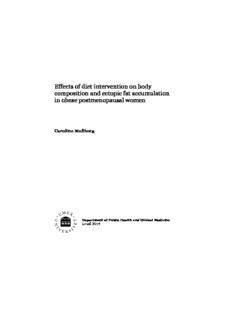
Effects of diet intervention on body composition and ectopic fat accumulation in obese ... PDF
Preview Effects of diet intervention on body composition and ectopic fat accumulation in obese ...
Effects of diet intervention on body composition and ectopic fat accumulation in obese postmenopausal women Caroline Mellberg Department of Public Health and Clinical Medicine Umeå 2014 Responsible publisher under Swedish law: the Dean of the Medical Faculty This work is protected by the Swedish Copyright Legislation (Act 1960:729) ISBN: 978-91-7601-159-1 ISSN: 0346-6612 Elektronisk version tillgänglig på http://umu.diva-portal.org/ Printed by: Print & Media, Umeå universitet Umeå, Sweden 2014 I rörelse Den mätta dagen, den är aldrig störst. Den bästa dagen är en dag av törst. Nog finns det mål och mening i vår färd - men det är vägen, som är mödan värd. Det bästa målet är en nattlång rast, där elden tänds och brödet bryts i hast. På ställen, där man sover blott en gång, blir sömnen trygg och drömmen full av sång. Bryt upp, bryt upp! Den nya dagen gryr. Oändligt är vårt stora äventyr. Karin Boye Table of Contents Table of Contents ................................................................................................ i Abstract ............................................................................................................... iii Original papers ................................................................................................... v Abbreviations ..................................................................................................... vi Sammanfattning på svenska ....................................................................... vii Introduction ......................................................................................................... 1 Obesity ................................................................................................................................... 1 Central obesity and ectopic lipid deposition ......................................................... 1 The interplay between adipose tissue and liver ................................................... 2 Muscles ................................................................................................................................... 3 Postmenopausal women ................................................................................................ 4 Diet interventions ............................................................................................................. 5 Fat ............................................................................................................................................ 5 Carbohydrates .................................................................................................................... 6 Protein ................................................................................................................................... 7 Our intervention studies ................................................................................................. 7 Materials and Methods ..................................................................................... 9 Study I .................................................................................................................................... 9 Dietary intervention and assessment .............................................................. 9 Studies II and III ............................................................................................................. 10 Dietary intervention and assessment ........................................................... 11 Anthropometry ....................................................................................................... 12 Dual-‐Energy X-‐ray Absorptiometry ............................................................... 12 Estimation of insulin sensitivity ..................................................................... 12 Hyperinsulinaemic euglycaemic clamp ................................................................ 12 Homeostasis model assessment .............................................................................. 13 Oral glucose tolerance test (OGTT) ........................................................................ 13 Indices for insulin sensitivity .................................................................................... 13 Magnetic resonance imaging and spectroscopy ...................................... 13 Visceral and subcutaneous adipose tissue (VAT and SAT) .......................... 14 Resting metabolic rate ........................................................................................ 14 Physical activity energy expenditure ............................................................ 14 Dietary assessment ............................................................................................... 15 Measurement of nitrogen excretion in urine (NU) ................................. 15 Metabolic parameters in blood and urine .................................................. 16 Statistics ............................................................................................................................. 16 Study I ......................................................................................................................... 16 i Studies II and III ..................................................................................................... 17 Randomisation and stratification ............................................................................ 17 Generalized estimating equation (GEE) ............................................................... 17 Imputations ....................................................................................................................... 18 Results and Discussion .................................................................................. 19 Study I ................................................................................................................................. 19 Study II ................................................................................................................................ 22 Study III .............................................................................................................................. 23 Missing data ..................................................................................................................... 25 General discussion and future challenges .............................................. 27 Summary and conclusions ........................................................................... 31 Acknowledgements/Tack ............................................................................ 32 References ......................................................................................................... 35 ii Abstract Background Obesity is increasing worldwide and is a major contributor to morbidity and mortality. Notably, abdominal (central) obesity carries a high risk of obesity-related diseases, while peripheral fat accumulation can act in a protective manner. A redistribution of fat from peripheral to central depots is seen after the menopause and is associated with an increasing prevalence of diabetes and cardiovascular disease. A key mediator may be ectopic fat accumulation in the liver. Our hypothesis was that a Palaeolithic-type diet (PD) consumed ad libitum improves body composition and metabolic risk markers, including liver fat and insulin sensitivity, in obese postmenopausal women. Methods In study I the study subjects (n=10) used a PD during 5 weeks. In study II and III (n=70) the effect of a Palaeolithic-type diet (PD) was compared to a diet according to the Nordic Nutrition Recommendations diet (NNR) during a 2-year randomized clinical trial (RCT). Food records and nitrogen excretion in urine validated food intake. Anthropometric measurements were performed in a standardized manner. Body composition was calculated using Dual Energy X-ray Absorptiometry (DXA). Total energy expenditure was calculated by accelerometry (Actiheart®) in combination with indirect calorimetry. Liver and muscle fat content was estimated by magnet resonance spectroscopy (1H-MRS). Insulin sensitivity was measured either with hyperinsulinemic euglycemic clamps (paper I) or oral glucose tolerance tests (OGTTs) (paper III). Results In study I a significant weight loss, linked to improved lipid and blood pressure levels, was associated with a 49% decrease in liver fat. Concomitantly, hepatic insulin sensitivity improved, while peripheral insulin sensitivity (and muscle fat) was unaltered. In study II/III both groups had a significant and sustained weight loss after 2 years. The PD was more effective than the NNR diet regarding loss of weight and fat mass after 6 months, but not after 24 months. Serum triglyceride levels were significantly lower at 24 months in the PD group. Liver fat decreased throughout the study in both groups. Hepatic insulin sensitivity improved during the first 6 months of the study, while peripheral insulin sensitivity did not change. Hepatic insulin sensitivity was associated with liver fat at baseline, but not during the diet intervention. Energy expenditure did not change in any of the study groups. Conclusion Ad libitum diets can have sustained beneficial effects on weight and body composition in obese postmenopausal women, a PD being more iii effective on short-term than a diet according to the NNR. This is associated with a reduction in liver fat that may reduce the risk of future diabetes and cardiovascular disease. Further studies are needed in order to explore the association between liver fat and metabolic dysfunction, including insulin sensitivity. iv Original papers The thesis is based on the following papers: I. Ryberg M, Sandberg S, Mellberg C, Stegle O, Lindahl B, Larsson C, Hauksson J, Olsson T. A Palaeolithic-type diet causes strong tissue- specific effects on ectopic fat deposition in obese postmenopausal women. J Intern Med 2013; 274: 67-76. II. Mellberg C, Sandberg S, Ryberg M, Brage S, Larsson C, Olsson T, Lindahl B. Long-term effects of a Palaeolithic-type diet in obese postmenopausal women: a 2-year randomized trial. Eur J Clin Nutr 2014; 68: 350-7. III. Mellberg C, Otten J, Ryberg M, Sandberg S, Hauksson J, Lindahl B, Larsson C, Olsson T. Decreased liver fat during a two-year diet intervention was not associated with improvement in hepatic insulin sensitivity. Manuscript. v
Description: